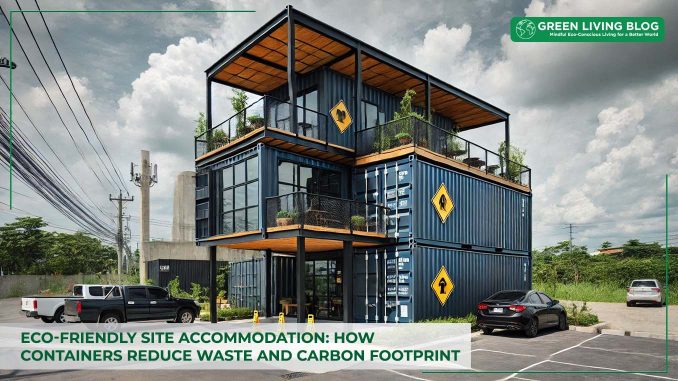
Sustainability isn’t just a buzzword anymore, it’s essential.
With industries across the globe rethinking their environmental impact, the construction sector is stepping up as well. Traditionally, construction sites have been notorious for generating mountains of waste and contributing heavily to carbon emissions.
But a shift towards eco-friendly site accommodation, driven by innovative solutions like repurposed shipping storage containers, is reshaping the industry.
Companies like Bell Containers are paving the way with sustainable, practical alternatives. By repurposing shipping containers into customised site accommodations, businesses can reduce waste and minimise their carbon footprints.
Here’s how these containers are changing the game for environmentally conscious construction projects.
Why the Construction Industry Needs Sustainable Accommodation

The Environmental Cost of Traditional Methods
Think about your average construction site. Temporary accommodations—be it offices, break rooms, or storage units—are often built from scratch using resource-heavy materials like timber, concrete, and steel. Once the project is over, these structures are usually torn down, sending massive amounts of waste to landfills.
The process doesn’t stop there. Producing and transporting these materials contribute significantly to greenhouse gas emissions. When you consider the environmental cost, the traditional approach to site accommodation feels unsustainable in every sense.
The Shift Towards Sustainability
As sustainability takes centre stage, certifications like LEED and BREEAM are pushing the construction industry to adopt greener practices. It’s no longer just about ticking boxes; it’s about creating meaningful change. Repurposed containers are leading the charge by offering a practical, low-impact solution for temporary site needs.
Containers: The Sustainable Solution for Modern Construction Sites
Cutting Down on Waste
When you repurpose a shipping container, you’re recycling an existing structure rather than building something entirely new. This eliminates the need for raw materials like timber and steel while dramatically reducing waste.
Containers are also modular, meaning they can be easily moved, reassembled, or repurposed across multiple projects. Unlike traditional structures that are demolished after use, containers are a long-term solution, saving resources and reducing landfill waste.
Lowering Carbon Emissions
Constructing a new building comes with a high environmental price tag. In contrast, repurposing a container drastically reduces the energy needed for production and transportation, slashing the associated carbon footprint.
Their compact, stackable design allows multiple containers to be transported in one trip, further reducing emissions. On-site, containers can be insulated with eco-friendly materials and fitted with energy-efficient systems, creating accommodations that are both sustainable and cost-effective.
The Benefits of Modular and Durable Design

Flexibility for Every Project
One of the standout features of container-based accommodation is its adaptability. Need extra office space? Add another container. Downsizing? Remove one. These units can be customised for various purposes—offices, storage, or even worker housing—and adjusted as project demands evolve.
This flexibility not only simplifies space management but also reduces resource use. Instead of building or demolishing, you can expand or shrink your setup with minimal environmental impact.
Built to Last
Originally designed to endure the harshest conditions at sea, shipping containers are incredibly durable. They can withstand severe weather and heavy use, making them far more robust than traditional temporary structures. This longevity means they need replacing less often, reducing both costs and waste over time.
Reducing Waste During Setup and Decommissioning
Fewer Materials, Less Waste
Containers arrive ready-made and require only minimal modifications, significantly cutting down on the raw materials needed for construction. Modular design also means fewer offcuts and less waste during setup compared to traditional building methods.
Easily Relocated and Reused
When a project wraps up, containers don’t need to be torn down. They can be moved to a new site or repurposed for different uses, ensuring they stay in circulation rather than ending up as waste. This reusability makes containers one of the most sustainable options for site accommodation.
Energy and Water Efficiency: Smarter Site Solutions

Integrating Renewable Energy
Shipping containers are ideal for pairing with renewable energy sources. Solar panels can be installed to power lighting, heating, or equipment, cutting down on reliance on fossil fuels. This not only reduces emissions but also lowers operational costs.
Solar power can also support underfloor heating or water heating systems, enhancing the overall sustainability of the site without compromising comfort.
Water Conservation with Smart Systems
Containers can easily incorporate water-saving technologies like rainwater harvesting systems. Collected rainwater can be used for cleaning or toilet flushing, drastically reducing the site’s reliance on mains water. Additionally, flow reducers and eco-friendly taps can ensure efficient water use.
Sustainability and Worker Well-Being
Healthier Workspaces
Eco-friendly site accommodation isn’t just better for the planet, they’re better for people too. Containers can be fitted with non-toxic insulation, proper ventilation, and energy-efficient systems to maintain a healthy indoor environment. Improved air quality makes these spaces more comfortable and safer for workers.
Energy-Efficient Comfort
Using sustainable materials for insulation and ventilation not only reduces energy consumption but also enhances comfort for those using the space. A healthier, well-designed workspace can boost morale and productivity, creating benefits that extend beyond sustainability.
Meeting Green Standards and Certification Goals

Achieving Sustainability Credentials
For companies aiming to meet green certification standards like LEED, BREEAM, or Green Globe, container-based accommodation is a smart choice. By reusing materials, integrating renewable energy, and conserving water, these units tick all the boxes for eco-conscious construction.
Certified structures also appeal to environmentally minded clients and stakeholders, boosting the company’s reputation and marketability.
Real-World Success Stories
From large-scale infrastructure projects to smaller eco-conscious construction sites, containers have proven their worth. Businesses using container-based accommodation have seen reductions in waste, costs, and emissions while improving site efficiency. These case studies highlight the practical advantages of making the switch to sustainable solutions.
Finding the Right Provider
To maximise the benefits of container-based accommodation, work with a provider who understands the importance of sustainability. Look for companies that offer custom solutions, like solar panels, rainwater systems, and green certifications, to align with your environmental goals.
Conclusion
Repurposed containers are transforming the construction industry’s approach to site accommodation. They’re reducing waste, cutting carbon footprints, and proving that sustainability doesn’t have to come at the expense of practicality or cost. For forward-thinking businesses, containers represent a durable, adaptable, and eco-friendly solution that aligns with the demands of a greener future.
![]()
Author Profile
- Passionate content creator, contributor, freelance writer and content marketing allrounder.
Latest entries
 Green LivingApril 17, 20254 Eco-Friendly Habits to Pair With Your Herbal Tea Ritual
Green LivingApril 17, 20254 Eco-Friendly Habits to Pair With Your Herbal Tea Ritual Best practicesApril 12, 2025Top 6 Eco-Friendly Choices for Sustainable Living in Your Everyday Life
Best practicesApril 12, 2025Top 6 Eco-Friendly Choices for Sustainable Living in Your Everyday Life BusinessMarch 31, 2025How to furnish your Office with sustainable Cardboard Furniture
BusinessMarch 31, 2025How to furnish your Office with sustainable Cardboard Furniture Best practicesMarch 21, 202511 Practical Ways to Limit Your Exposure to Microplastic Pollution
Best practicesMarch 21, 202511 Practical Ways to Limit Your Exposure to Microplastic Pollution






Leave a Reply
You must be logged in to post a comment.